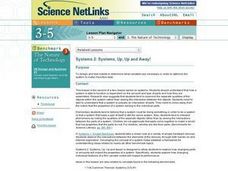NASA
Launch Altitude Tracker
Using PVC pipe and aquarium tubing, build an altitude tracker. Pupils then use the altitude tracker, along with a tangent table, to calculate the altitude of a launched rocket using the included data collection sheet.
NASA
Foam Rocket
When going for distance, does it make a difference at what angle you launch the rocket? Teams of three launch foam rockets, varying the launch angle and determining how far they flew. After conducting the series of flights three times,...
NASA
Pop! Rockets
Off they go — launching rockets is fun. The lesson plan contains templates to build paper rockets that can be launched from a PVC pipe launcher. Individuals or groups build the rockets and determine the shapes for their fins. Included...
NASA
Applying Newton’s Laws
Newton's Laws get the rocket to work, but do they serve any other functions? A six-page resource classifies rockets by the type of propellant they use. It then describes applications of Newton's Laws of Motion, both in the ability to...
Institute of Electrical and Electronics Engineers
Blast Off!
With the use of a model rocket kit, aspiring aerospace engineers work cooperatively to construct and launch a rocket. A preparatory reading assignment is included, covering Newton's laws of motion and information about the first...
Curated OER
Action-Reaction! Rocket
Students construct a rocket from a balloon propelled along a guide string. They use this model to learn about Newton's three laws of motion, examining the effect of different forces on the motion of the rocket. They measure the distance...
Curated OER
Altitude of A Rocket
The first two slides set up the conditions for this "experiment on paper". A fun activity where students chose which of the rockets will fly higher in the situations given. Each slide is followed by an answer page and this presentation...
Curated OER
3-2-1 Pop!
Pairs of space scientists or junior physicists construct and deploy antacid-powered rockets. Through this activity, they observe Newton's Laws of Motion. The plan is detailed and well-organized. Resource links include professionally...
Teach Engineering
Get Me Off This Planet
What do Newton's Laws have to do with getting from Earth to Mars?The activities in this resource show how Newton's Laws work with rockets to get them into space. Background information includes facts about orbits and how orbits are used...
NASA
Paper Rockets
Get first hand experience in rocket building and motion through an easy-to-follow picture and word-based directions sheet. Here, learners build a paper rocket by wrapping and taping paper strips around a pencil, and then launching their...
Curated OER
Systems, UP, Up and Away!
Students discuss rockets and how they work. Students research basic information about the Space Shuttle. Students work in collaborative groups creating "rockets" with empty film canisters. Students launch their "rockets" and record...
Curated OER
Antacid Tablet Race
Students complete experiments to determine how rocket fuel is affected by surface area and temperature. They compare the reaction rates of antacid tablets. They discuss their results to complete the lesson.
Curated OER
Alka Rockets
Students design a paper rocket propelled by Alka-Seltzer and water to demonstrate Newton's third law of motion. They, in pairs, determine the best combination of Alka-Seltzer and water to produce the maximum launch height and record...
Curated OER
Newton Gets Me Moving
Fourth graders experiment with Newton's three laws of motion. In this motion lesson, 4th graders explore the three laws of motion and then work in small groups collaborating while experimenting with these laws. Numerous resources are...
Curated OER
Blast Off!
Fourth graders investigate the third law of motion. In this third law of motion lesson, 4th graders explore the forces necessary for a rocket to launch. Students compare and contrast propellant and fuel. Numerous resources are provided.
Curated OER
Rockets!!
Students launch a rocket. In this laws of motion lesson, students discuss the forces of flight, how a plane flies and how a rocket gets off the ground. Students watch a video about rocket launches, discuss Newton's Third Law of Motion...
Curated OER
Up, Up and Away
Fourth graders design and launch rockets. In this rocket lesson, 4th graders observe the changes in outcome caused by size and fuel variables. Students navigate the NASA website to learn the parts of a rocket. Students load the canister...
Curated OER
Blast Off with Model Rockets
Learners investigate science and math by building a rocket. In this geometry instructional activity, students build a rocket using paper towel tubes while investigating questions about launching a rocket. They discuss balance and unique...
Curated OER
Blast Off!
Students build their own rockets. In this rocket lesson, students create the highest flying rocket they can powered by effervescent antacid tablets and water in film canisters. They listen to the story How to Build a Rocket by Hazel...
Curated OER
Exploring the Ares 1-X Launch-Downrange Distance
In this Ares 1-X launch instructional activity, students read about the path of this rocket's launch and solve 2 problems. Students find the number of seconds it took the rocket to fall from a given altitude and they determine how far...
Curated OER
Paper Rockets
Learners create rockets to test stability. In this rocketry lesson, students discover how rockets fly through air as they follow the procedures included in this activity.
Curated OER
R is for Rocket
For this handwriting practice worksheet, students trace and practice writing the letter 'R' both in upper and lower case letters. They also identify the object illustrated and trace and write the term rocket as shown.
Curated OER
Payload Rocket
Young scholars continue their examination of how to make a human presence in space. Using Newton's Laws of Motion, they discover the difference a rocket's payload affects the launch of a rocket. They develop a balloon rocket and test...
Curated OER
Balloon Rockets
Young scholars, after reviewing and analyzing Newton's third law of motion, make balloon rockets and experiment with a variety of models. After the experiment, they chart the results and form conclusions. In addition, they...

























